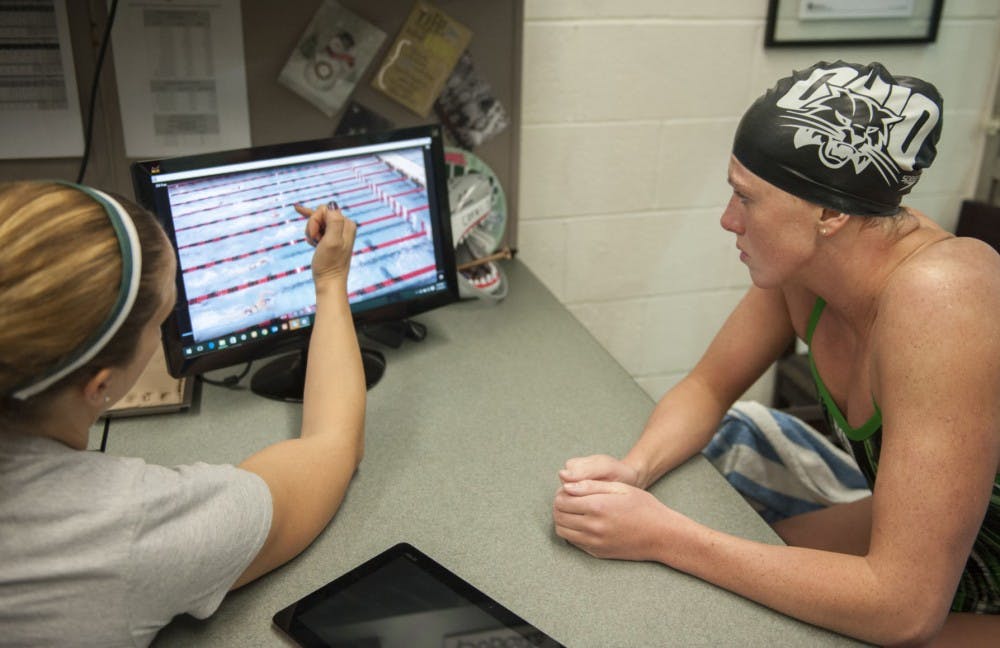Rachel Komisarz-Baugh has a multifaceted coaching approach to which Ohio has responded quite well
It could be a little intimidating to meet Ohio coach Rachel Komisarz-Baugh.
It might just be her fierce competitive aura, but Komisarz-Baugh's strong presence symbolizes a coach pushing her swimmers to be their best.
"Even the guys on the football team are like, 'Oh yeah, your coach is a bit scary,'" junior Laura Dawson said.
Dawson, one of most fierce competitors on Ohio's team, loves that her coach shares her fiery, competitive spirit.
As a swimmer during the early to mid-2000s, Komisarz-Baugh, who hails from Warren, Michigan, won numerous international medals, including an Olympic gold and silver medal in 2004. Simply put, the second-year coach knows much about the sport of swimming.
“She can be intimidating sometimes, but you don’t get to be one of the best swimmers in the world by tiptoeing around people," Dawson said of Komisarz-Baugh. “I wouldn’t want a coach that was seen as passive and stuff like that. That’s not the example I would want my team to have.”
Even though a first encounter with Komisarz-Baugh can be daunting, those that get to know her better realize there are other words to describe her besides "scary." Words like "caring" and "altruistic" can come to mind instead.
Freshman Corrin Van Lanen said Komisarz-Baugh loves to tell the Bobcats about her dogs, and that Komisarz-Baugh reiterates she is not a robot. The Bobcats have even seen her cry.
Dawson’s father, who Dawson said was her biggest fan and a big part of her swimming career, died right before she returned to Ohio last season. Dawson said Komisarz-Baugh took over the role as “the one person in her life that understood her swimming” upon her father’s death.
So despite the intimidating stigma, there are many layers to Komisarz-Baugh. Perhaps the one with the biggest impact on her team’s success is her academic background and coaching mindset.
Remember when jocks were stereotyped as "dumb" or "thick headed"? The sporting world is relying on academia as time passes. Recently, the Golden State Warriors, an NBA team, began experimenting with putting sensors on their players to track when their bodies became too fatigued in order to see if it could help them come up with proper minute distributions.
Komisarz-Baugh said swimming is heading in a similar direction, with coaches beginning to prefer high intensity training instead of volume training.
“We’re constantly talking about training smarter and not harder,” Komisarz-Baugh said. “And I think there’s only so much work you can do until you have to do it more efficiently.”
When Van Lanen steps into Komisarz-Baugh's office for a film session, it is to work on her breathing, which she said is crucial in sprinting events, such as the 50 or 100-yard freestyles.
“Even if you can increase your breath by .05 seconds over the course of a 100 (yard freestyle), you’re taking about 6 or 7 breaths per lane. 28 breaths times. So, there’s a time drop there,” Komisarz-Baugh said, explaining how Van Lanen could improve her times.
Komisarz-Baugh went on to apply the same logic to a distance swimmer.
“If you multiply that over a mile or over a 500 (yard freestyle), those minuscule changes make a huge difference, not only in the time but also in that you're efficient with your breathing, that oxygen's getting to your muscles, and then you’re also creating less fatigue on your body," Komisarz-Baugh said. "So, there’s so many components that could go into fixing somebody’s breath."
Van Lanen and Dawson said changing habits that have worked for them for years in order to improve their times can be difficult, but Dawson said it's an important part of being an athlete.
But for every new, efficient, more complicated way of thinking, there is an older way that some will say has worked for years and shouldn’t change. Komizars-Baugh says the "old school" versus "new school" battle also exists in the realm of swim training.
“There’s definitely old school training that is just grind out the yardage and swim, swim, swim, til you can’t swim anymore,” Komizars-Baugh said.
She said while there can be success with this model, there also tends to be more injuries with it as well.
{{tncms-asset app="editorial" id="26a4d9c6-bb06-11e5-89c1-3bc3f99a6ac1"}}
“I think in this day and age there’s no reason for us to have to work our athletes to that level, and potentially create some injuries that they’ll have to deal with their whole lives. So, I think it has to be smarter than harder," Komisarz-Baugh said, whose salary is $81,600, according to OU Spokeswoman Katie Quaranta.
At the University of Louisville invitational in November, Ohio posted over 20 career-best times, per Komisarz-Baugh.
Say what you want about the coaching style of Komisarz-Baugh, except that it isn’t working.
@JAjimbojr
jw331813@ohio.edu






